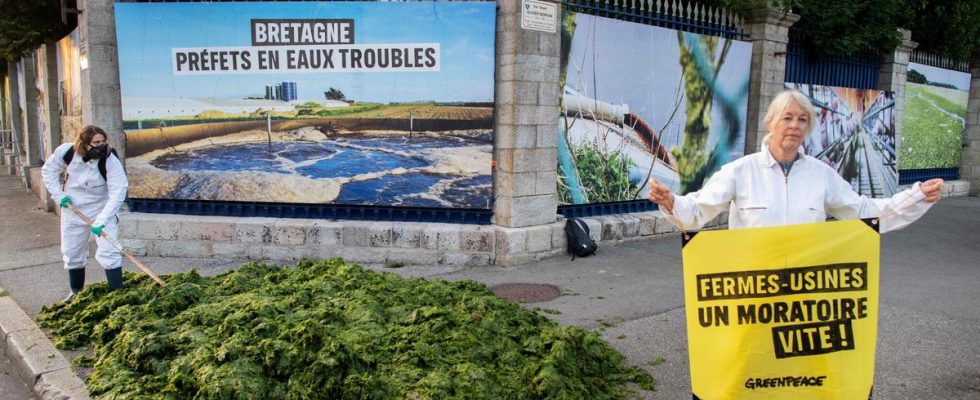Good morning, as Canadians say. This Monday, the services of the prefecture of Finistère discovered that a large pile of green algae had been deposited in front of their building located in Quimper. The authors of this action are known. A large yellow banner from the Greenpeace association was unfurled above the ton of ulva dumped in front of the prefecture. “Farm factories: neither here nor elsewhere”, it was written. Activists in white coveralls also deployed a message saying: “Brittany polluted: guilty state”. Photos of giant farms have been hung on the facade.
Through this action, the French NGO wanted to denounce the green algae scandal. A real scourge for Brittany, they flow at the end of spring on certain beaches and mudflats in Finistère and Côtes-d’Armor. Morbihan is also affected, particularly in the Lorient sector. “We are here to denounce this model of industrial farming which, in the face of the environmental and climate crisis, is leading us straight into the wall, and which we no longer want, neither here nor elsewhere”, justifies Sandy Olivar Calvo, responsible for Agriculture campaign to Greenpeace in a statement. “The State must take its responsibilities and initiate an exit from factory farming by establishing a moratorium on all new projects for the creation or extension of factory farms in France. »
The association storms in particular against the authorization to extend the pigsty to 12,000 pigs in Avel Vor, in Landunvez (Finistère), validated by the prefect in November 2022. An appeal has been filed. In the municipality, some beaches have been closed for several years due to insufficient water quality. In the country of Léon, in the north of Finistère, the breeding of pigs exceeds in places 3,000 pigs per km².
The deadly risks of gas
This year, seaweed strandings are mainly concentrated in the bay of Saint-Brieuc, particularly in Hillion, where some beaches are closed. Exceedances of hydrogen sulphide concentration have already been recorded. This poisonous and potentially deadly gas is released by algae as they decay. To avoid this phenomenon, regular pick-ups are organized on the beaches. “We pick up a lot less than in other years”, recently assured the prefect of Côtes-d’Armor. As this cleaning is carried out using tractors, it is not possible on mudflats and rocky areas. A sea pick-up test was started in the fall and is to continue this summer using an amphibious vehicle

